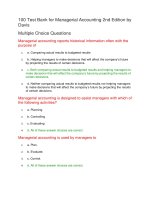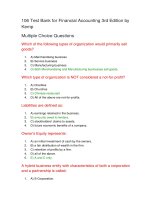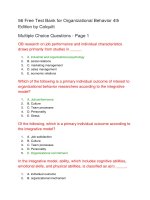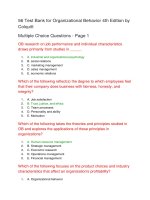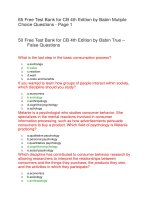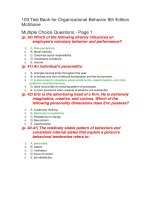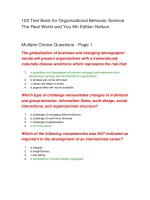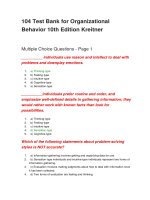103 test bank for organizational behavior 4th edition by colquitt đề trắc nghiệm marketing
Bạn đang xem bản rút gọn của tài liệu. Xem và tải ngay bản đầy đủ của tài liệu tại đây (129.48 KB, 26 trang )
103 Test Bank for Organizational Behavior 4th Edition by
Colquitt
True - False Questions
The Rule of One-Eighth suggests that about 88 percent of the companies will
actually do what is required to build profits by putting people first.
1.
True
2.
False
Leader power and negotiation summarize how individuals attain authority over
others.
1.
True
2.
False
The resource-based view suggests that a resource is more valuable when it can
be imitated.
1.
True
2.
False
Given that good employees move from one organization to another, they do not
create a resource valuable enough for creating competitive advantage.
1.
True
2.
False
Analyses are written predictions that specify relationships between variables.
1.
True
2.
False
Evidence-based management is a perspective that argues that scientific
findings should not form the foundation for management education.
1.
True
2.
False
Causal inferences means establishing that one variable really does cause
another.
1.
True
2.
False
Much of what we know about organizational behavior is considered universal
and "culture-free" showing that managing people faces the sane challenges
everywhere.
1.
True
2.
False
The strength of a correlation can be inferred from the "compactness" of its
scatterplot.
1.
True
2.
False
Like individual characteristics, group mechanisms shape satisfaction, stress,
motivation, trust, and learning.
1.
True
2.
False
Proponents of evidence-based management argue that human resources
should be transformed into a sort of R&D department for managing people.
1.
True
2.
False
A correlation describes the statistical relationship between two variables.
1.
True
2.
False
According to the method of experience, people hold firmly to some belief
because scientific studies have tended to replicate results using a series of
samples, settings, and methods.
1.
True
2.
False
The method of authority suggests that people hold firmly to some belief
because some respected official, agency, or source has said it is so.
1.
True
2.
False
To counter the effects of a bad product, effective management of OB can help
make the product get better, incrementally, over the long term.
1.
True
2.
False
Trust, justice, and ethics capture what employees feel when thinking about
their jobs and doing their day-to-day work.
1.
True
2.
False
The method of intuition suggests that people hold firmly to some belief
because it seems obvious or self-evident.
1.
True
2.
False
Job satisfaction reflects employees' psychological responses to job demands
that tax or exceed their capacities.
1.
True
2.
False
Meta-analyses cannot form the foundation for evidence-based management.
1.
True
2.
False
The integrative model of OB was designed with the Rule of One-Eighth in mind.
1.
True
2.
False
Resources like culture, teamwork, trust, and reputation are termed "socially
complex" because it is not always clear which organizations do (and do not)
possess them, though it is clear how they came to develop.
1.
True
2.
False
Big decisions are visible to competitors and observable by industry experts.
1.
True
2.
False
The integrative model of OB presents five individual mechanisms that directly
affect the individual outcomes: motivation; learning and decision making; job
performance; leadership styles and behaviors; and ethics.
1.
True
2.
False
It is often easy to "fix" companies that struggle with OB issues.
1.
True
2.
False
People create history, a collective pool of experience, wisdom, and knowledge
that benefits the organization.
1.
True
2.
False
Job satisfaction does not have an effect on job performance and organizational
commitment.
1.
True
2.
False
The integrative model of organizational behavior suggests that individual
mechanisms result in organizational and group mechanisms which, when
combined with individual characteristics, lead to individual outcomes.
1.
True
2.
False
Understanding correlation is important because OB questions are not "yes or
no" in nature.
1.
True
2.
False
The best way to understand correlation between two variables is to look at a
scatterplot.
1.
True
2.
False
The Container Store, a retailer based out of Texas, is considering a
performance based incentive system for its employees. This is an example of
motivation.
1.
True
2.
False
Learning and decision making deal with how employees gain job knowledge
and how they use that knowledge to make accurate judgments on the job.
1.
True
2.
False
According to the resource-based view of organizations, a firm's resources do
not include resources related to organizational behavior, such as the
knowledge, ability, and wisdom of the workforce.
1.
True
2.
False
Theory is defined as a collection of assertions—both verbal and symbolic—that
specify how and why variables are related, as well as the conditions in which
they should (and should not) be related.
1.
True
2.
False
Firms that do not undergo an IPO typically have shorter histories and need an
infusion of cash to grow or introduce some new technology.
1.
True
2.
False
The theories and concepts found in OB are drawn from two disciplines: human
resources management and strategic management.
1.
True
2.
False
Strategic management focuses on the product choices and industry
characteristics that affect an organization's profitability.
1.
True
2.
False
The integrative model of OB acknowledges that employees work in one or more
work teams led by some formal leader.
1.
True
2.
False
Multiple Choice Questions - Page 1
_____ is a field of study devoted to understanding, explaining, and ultimately
improving the attitudes and behaviors of individuals and groups in
organizations.
1.
A. Organizational behavior
2.
B. Strategic management
3.
C. Economic research
4.
D. Operations management
5.
E. Financial management
Which of the following focuses on the product choices and industry
characteristics that affect an organization's profitability?
1.
A. Organizational behavior
2.
B. Process management
3.
C. Operations management
4.
D. Strategic management
5.
E. Human resource management
Which of the following reflect(s) the degree to which employees feel that their
company does business with fairness, honesty, and integrity?
1.
A. Job satisfaction
2.
B. Trust, justice, and ethics
3.
C. Team processes
4.
D. Personality and ability
5.
E. Motivation
Which organizational mechanism illustrated by the integrative model dictates
how the units within the firm link to other units?
1.
A. Organizational culture
2.
B. Organizational ability
3.
C. Organization size
4.
D. Organizational structure
5.
E. Organizational leadership
Which of the following is a primary individual outcome of interest to
organizational behavior researchers according to the integrative model?
1.
A. Job performance
2.
B. Culture
3.
C. Team processes
4.
D. Personality
5.
E. Stress
Which of the following considers employees' psychological responses to job
demands that tax or exceed their capabilities?
1.
A. Job satisfaction
2.
B. Ability
3.
C. Job performance
4.
D. Leadership style
5.
E. Stress
Which of the following takes the theories and principles studied in OB and
explores the applications of those principles in organizations?
1.
A. Human resource management
2.
B. Strategic management
3.
C. Economic research
4.
D. Operations management
5.
E. Financial management
Which of the following group mechanisms summarize how individuals attain
authority over others?
1.
A. Leader cultural values
2.
B. Leader personality
3.
C. Leader styles and behaviors
4.
D. Leader responsibilities
5.
E. Leader power and negotiation
Which of the following is an example of a group mechanism?
1.
A. Team characteristics and diversity
2.
B. Motivation
3.
C. Trust, justice, and ethics
4.
D. Organizational commitment
5.
E. Ability
Which of the following capture(s) the specific actions that leaders take to
influence others at work?
1.
A. Leader styles and behaviors
2.
B. Leader cultural values
3.
C. Leader personality
4.
D. Leader influence and negotiation
5.
E. Leader power
Research on satisfaction, emotions, and team processes found in OB draws
heavily from studies in _____.
1.
A. anthropology
2.
B. organizational goals
3.
C. industrial relations
4.
D. social psychology
5.
E. team management
In the integrative model which organizational mechanism captures shared
knowledge about the rules, norms, and values that shape employee attitudes
and behaviors?
1.
A. Organizational structure
2.
B. Organizational ability
3.
C. Organizational culture
4.
D. Job satisfaction
5.
E. Organizational leadership
Of the following, which is a primary individual outcome according to the
integrative model?
1.
A. Job satisfaction
2.
B. Culture
3.
C. Team processes
4.
D. Personality
5.
E. Organizational commitment
OB primarily uses _______ models to understand motivation, learning, and
decision making.
1.
A. marketing
2.
B. economic
3.
C. labor union
4.
D. strategic
5.
E. cultural
According to the integrative model, job satisfaction is a(n) ______.
1.
A. individual outcome
2.
B. organizational mechanism
3.
C. group mechanism
4.
D. individual mechanism
5.
E. group outcome
In the integrative model, ability, which includes cognitive abilities, emotional
skills, and physical abilities, is classified as a(n) _____.
1.
A. individual outcome
2.
B. organizational mechanism
3.
C. individual characteristic
4.
D. individual mechanism
5.
E. group outcome
OB research on job performance and individual characteristics draws primarily
from studies in _____.
1.
A. industrial and organizational psychology
2.
B. social relations
3.
C. marketing management
4.
D. sales management
5.
E. economic relations
Which of the following statements about the resource-based view of
organizations is false?
1.
A. It suggests that resources are valuable because they are rare.
2.
B. It describes what makes resources capable of creating long-term profits for the firm.
3.
C. It suggests that inimitable resources are of greater value to an organization.
4.
D. A firm's resources include resources related to organizational behavior.
5.
E. It suggests that the value of resources depends on a single factor.
_____ is the organizational mechanism in the integrative model that captures
"the way things are" in an organization.
1.
A. Organizational structure
2.
B. Organizational ability
3.
C. Organizational leadership
4.
D. Organizational performance
5.
E. Organizational culture
Which of these individual mechanisms captures the energetic forces that drive
employees' work efforts?
1.
A. Motivation
2.
B. Ability
3.
C. Job performance
4.
D. Personality
5.
E. Stress
Which of the following individual characteristics illustrated in the integrative
model of OB reflect the various traits and tendencies that describe how people
act, with commonly studied traits including extraversion, conscientiousness,
and collectivism?
1.
A. Trust, justice, and ethics
2.
B. Personality and cultural values
3.
C. Job performance and organizational commitment
4.
D. Learning and decision making
5.
E. Organizational structure and organizational culture
As employees gain experience, they obtain job knowledge and use this
knowledge to make accurate judgments on the job. Which individual
mechanism is referred to in this statement?
1.
A. Team processes
2.
B. Trust, justice, and ethics
3.
C. Learning and decision making
4.
D. Personality and ability
5.
E. Motivation
When a firm expands into a new product segment, it is known as _____.
1.
A. product recall
2.
B. product diversification
3.
C. monopolization
4.
D. cartelization
5.
E. product divestment
According to the integrative model of organizational behavior, motivation, trust,
justice, and ethics are _____.
1.
A. individual mechanisms
2.
B. organizational mechanisms
3.
C. group mechanisms
4.
D. individual outcomes
5.
E. group outcomes
Which of the following is one of the two primary goals managers have for their
employees?
1.
A. Maximization of job performance.
2.
B. Optimization of stock price.
3.
C. Rationalization of job structure.
4.
D. Utilization of rational decision making techniques.
5.
E. Obedience to organizational rules and regulations.
56 Free Test Bank for Organizational Behavior 4th Edition
by Colquitt Multiple Choice Questions - Page 2
_______ are written predictions that specify relations between variables.
1.
A. Hypotheses
2.
B. Verifications
3.
C. Theories
4.
D. Data
5.
E. Collections
The level of creativity demonstrated by PIXAR animators is rare. Therefore,
according to the _______, these employees are valuable to the firm.
1.
A. resource-based view of organizations
2.
B. integrative theory of organizational behavior
3.
C. normative selection model
4.
D. economic theory of the firm
5.
E. performance based theory of organizations
Donna believes that 360 degree performance review is ideal for her company
because she recently read about a major survey of Fortune 100 companies that
highlighted the effectiveness of this method. Which of the following
philosophies is she relying on?
1.
A. Method of intuition
2.
B. Method of performance
3.
C. Method of behavior
4.
D. Method of reliability
5.
E. Method of science
The resource-based view suggests that a resource is more valuable when it is
_____.
1.
A. complex
2.
B. technologically advanced
3.
C. socially complex
4.
D. rare
5.
E. simple
Which of the following correlations indicate no statistical relationship between
two variables?
1.
A. 1
2.
B. -1
3.
C. 0
4.
D. 100
5.
E. -100
Which of the following conditions is necessary to establish causal inferences?
1.
A. The study was conducted in an open environment.
2.
B. No alternative explanation exists for the correlation.
3.
C. The presumed effect precedes the presumed cause in time.
4.
D. The two variables are not correlated.
5.
E. The sample size is large enough.
Which of the following is not one of the methods by which people "know"
things?
1.
A. Method of education
2.
B. Method of experience
3.
C. Method of intuition
4.
D. Method of authority
5.
E. Methods of science
Culture, teamwork, trust, and reputation are examples of _____.
1.
A. socially complex resources
2.
B. easy-to-develop resources
3.
C. natural structures
4.
D. evidence-based resources
5.
E. associative structures
Which of these is one of the conditions necessary to establish causal
inferences?
1.
A. The presumed cause succeeds the presumed effect in time.
2.
B. Multiple alternative explanations exist for the correlation.
3.
C. Factors other than the variables in question could create causation.
4.
D. The two variables are correlated.
5.
E. The sample size is large enough.
In the 1960s, a popular ad stated that "Blondes have more fun!" This is an
example of ______.
1.
A. a positive correlation
2.
B. negative causation
3.
C. data
4.
D. verification
5.
E. a proven fact
Frank, an HR manager, believes that his implementation of HR practices in the
company is impeccable, because he received the inputs for these practices
from the CEO himself. Which of the following philosophies is he relying on?
1.
A. Method of intuition
2.
B. Method of behavior
3.
C. Method of science
4.
D. Method of experience
5.
E. Method of authority
Choose the method which suggests that people accept some belief because
scientific studies have tended to replicate that result using a series of samples,
settings, and methods?
1.
A. Method of intuition
2.
B. Method of authority
3.
C. Method of science
4.
D. Method of experience
5.
E. Method of behavior
The scientific method begins with _____.
1.
A. auditing
2.
B. hypotheses
3.
C. theory
4.
D. verification
5.
E. paradigm
Correlation can be positive or negative and can range from _____.
1.
A. -1 to +1
2.
B. -2 to +2
3.
C. 0 to +100
4.
D. -10 to 0
5.
E. -100 to +100
Which of these takes all the correlations found in studies of a particular
relationship and calculates a weighted average of them?
1.
A. Alpha analysis
2.
B. Gamma analysis
3.
C. Meta-analysis
4.
D. Causal analysis
5.
E. Beta analysis
Which of the following methods suggests that people hold firmly to some belief
because it is consistent with their own experience and observations?
1.
A. Method of intuition
2.
B. Method of authority
3.
C. Method of science
4.
D. Method of experience
5.
E. Method of behavior
The resource-based view of organizations suggests that a resource is more
valuable when it is _____.
1.
A. complex
2.
B. simple
3.
C. inimitable
4.
D. expensive
5.
E. new
In organizational behavior research, a correlation of +1 between two variables
is considered:
1.
A. weak.
2.
B. to be an absence of relationship.
3.
C. arbitrary.
4.
D. irrelevant.
5.
E. perfect.
Which of the following correlations indicate a perfect statistical relationship
between two variables?
1.
A. 1
2.
B. -1
3.
C. 0
4.
D. 100
5.
E. -100
_____ is defined as a collection of assertions that specify how and why
variables are related, as well as the conditions in which they should and should
not be related.
1.
A. Hypothesis
2.
B. Information
3.
C. Paradigm
4.
D. Data
5.
E. Theory
Culture, trust, teamwork, and reputation are termed "_____" because it's not
always clear how they came to develop, though it is clear which organizations
do possess them.
1.
A. socially complex
2.
B. vague
3.
C. natural structures
4.
D. evidence-based resources
5.
E. associative structures
Which of the following argues that scientific findings should form the
foundation for management education?
1.
A. Traditional Management
2.
B. Evidence-based management
3.
C. Resource-based view
4.
D. Contingency approach
5.
E. Management by objectives
Which of these is one of the conditions necessary to establish causal
inferences?
1.
A. The two variables are not correlated.
2.
B. Multiple alternative explanations exist for the correlation.
3.
C. The presumed cause precedes the presumed effect in time.
4.
D. The study was conducted in an open environment.
5.
E. The sample size is large enough.
Of the following methods, which suggests that people hold firmly to some
belief because some respected official, agency, or source has said it is so?
1.
A. Method of intuition
2.
B. Method of authority
3.
C. Method of science
4.
D. Method of experience
5.
E. Method of behavior
Which of the following explains the term causal inferences?
1.
A. Proving that two variables are correlated.
2.
B. Making sure the sample size is adequate enough.
3.
C. Explaining why one variable is not correlated to another.
4.
D. Analyzing a situation and understanding what went wrong.
5.
E. Establishing that one variable really does cause another.
Tran is interested in the effects of the choice of reward on employee motivation.
She knows that there have been several studies done on this subject and
compares their results looking for an average correlation. Tran is conducting a
______.
1.
A. meta-analysis
2.
B. mediocre analysis
3.
C. medial analysis
4.
D. remedial analysis
5.
E. moderated analysis
Which of the following suggests that people hold firmly to some belief because
it "just stands to reason"—it seems obvious or self-evident?
1.
A. Method of intuition
2.
B. Method of authority
3.
C. Method of science
4.
D. Method of experience
5.
E. Method of behavior
_______ summarize the statistical relationships between variables.
1.
A. Datasets
2.
B. Correlations
3.
C. Observations
4.
D. Collections
5.
E. Consolidations
According to the Rule of One-Eighth,
1.
A. at least 88 percent of organizations will do everything necessary to put people first and
thereby build profits.
2.
B. at best 12 percent of organizations will actually do what is required to build profits by
putting people first.
3.
C. 75 percent of organizations won't believe the connection between how they manage
their people and the profits they earn.
4.
D. 38 percent of the organizations try to make a single change to solve their problems.
5.
E. one in eight organizations miserably fails at making the people to profit connection.
The scientific method requires that theories be used to inspire _____.
1.
A. auditing
2.
B. hypotheses
3.
C. experience
4.
D. verification
5.
E. intuition
Who is considered to be the originator of the scientific method?
1.
A. Jeffrey Pfeffer
2.
B. Frederick Taylor
3.
C. Charles Darwin
4.
D. Sir Francis Bacon
5.
E. Adam Smith
10 Free Test Bank for Organizational Behavior 4th Edition
by Colquitt Free Text Questions
Explain the scientific method and its impact on Organizational Behavior.
Answer Given
The scientific method begins with theory, defined as a collection of assertions—both
verbal and symbolic—that specify how and why variables are related, as well as the
conditions in which they should (and should not) be related. But theories must be tested
to verify that their predictions are accurate. The scientific method requires the formation of
a hypothesis, which is a written prediction that specifies relationships between variables.
Then relevant data is collected and the hypothesis is verified or tested for accuracy. The
theory is reformulated if the hypothesis is wrong.
Identify the key individual outcomes in the studies of organizational behavior
and describe the factors that affect these key outcomes.
Answer Given
The key individual outcomes in studies of organizational behavior are job performance
and organizational commitment. The factors that affect these outcomes are individual
mechanisms (job satisfaction; stress; motivation; trust, justice & ethics; and learning &
decision making). Individual mechanisms, in turn, are driven by organizational
mechanisms (organizational culture and structure), group mechanisms (leadership: styles
& behaviors, and power & negotiation; and teams: processes and characteristics), and
individual characteristics (personality & cultural values and ability).
Briefly describe the four different ways of knowing things. Which way do you
believe provides the soundest explanation and most compelling support?
Answer Given
The four ways are: method of experience, method of intuition, method of authority, and
method of science. The method of science provides the soundest explanation and most
compelling support for arguments, provided the predictions are tested with data.
Define organizational behavior (OB). How does it differ from human resource
management?
Answer Given
OB is a field of study devoted to understanding, explaining, and ultimately improving the
attitudes and behaviors of individuals and groups in organizations, whereas HRM uses
the theories and principles studied in OB and explores the practical applications of those
principles in organizations.
Briefly explain correlation.
Answer Given
Correlation is a method used to identify the statistical relationship between two variables.
A correlation, abbreviated r, describes the statistical relationship between two variables.
Correlations can be positive or negative and range from 0 (no statistical relationship) to ±1
(a perfect statistical relationship).
Briefly explain the importance of individual mechanisms that feature in the
integrative model of organizational behavior.
Answer Given
Several individual mechanisms directly affect job performance and organizational
commitment. These include job satisfaction, which captures what employees feel when
thinking about their jobs and doing their day-to-day work. Another individual mechanism is
stress, which reflects employees' psychological responses to job demands that tax or
exceed their capacities. The integrative model also includes motivation, which captures
the energetic forces that drive employees' work effort. Trust, justice, and ethics reflect the
degree to which employees feel that their company does business with fairness, honesty,
and integrity. The final individual mechanism shown in the model is learning and decision
making, which deals with how employees gain job knowledge and how they use that
knowledge to make accurate judgments on the job.
Explain the Rule of One-Eighth.
Answer Given
According to the rule of One-Eighth, only one-half of organizations will believe the
connection between how they manage their people and the profits they earn. One-half of
these organizations, who see the connection, will do what other organizations have
already done—try to make a single change to solve their problems, not realizing that the
effective management of people requires a more comprehensive and systematic
approach. Of the firms that make comprehensive changes, probably only about one-half
will persist with their practices long enough to actually derive economic benefits. Thus
one-half times one-half times one-half equals one-eighth, at best 12 percent of
organizations will actually do what is required to build profits by putting people first.
Briefly explain the importance of group mechanisms that feature in the
integrative model of organizational behavior.
Answer Given
Employees typically work in one or more work teams led by some formal (or sometimes
informal) leader. Like the individual characteristics, these group mechanisms shape
satisfaction, stress, motivation, trust, and learning. Team characteristics and diversity
describes how teams are formed, staffed, and composed, and how team members come
to rely on one another as they do their work. Team processes and communication is how
teams behave, including their coordination, conflict, and cohesion. Leader power and
negotiation is all about how individuals attain authority over others and leader styles and
behaviors capture the specific actions that leaders take to influence others at work.
Using the resource-based view of the organization, explain how people are a
valuable resource. Provide an example to justify your answer.
Answer Given


